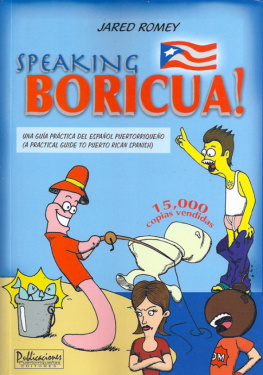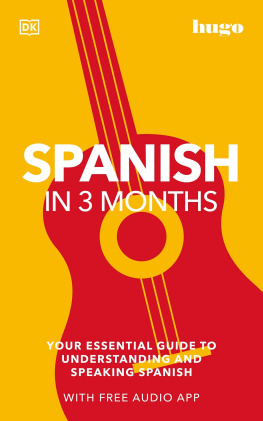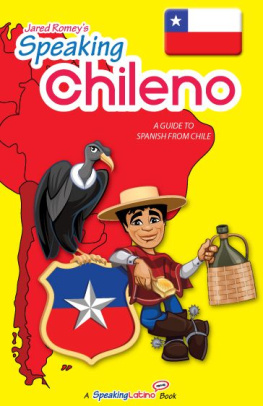Published by Jared Romey Copyright 2010-2012 Jared Romey Discover other Speaking Latino titles by Jared Romey at Amazon.com
License Notes This ebook is licensed for your personal enjoyment only. This ebook may not be re-sold or given away to other people. If you would like to share this book with another person, please purchase an additional copy for each recipient. If youre reading this book and did not purchase it, or it was not purchased for your use only, then please return and purchase your own copy. Thank you for respecting the hard work of this author.
Other Spanish Slang Dictionaries by Speaking Latino: Quick Guide to Cuban Spanish (Coming in Spring 2014) Quick Guide to Mexican Spanish
Speaking Argento (Argentina) Speaking Boricua (Puerto Rico) Speaking Phrases Boricua (Puerto Rican Sayings)
But thats the glory of foreign travel, as far as I am concerned. I dont want to know what people are talking about. I cant think of anything that excites a greater sense of childlike wonder than to be in a country where you are ignorant of almost everything. Suddenly you are five years old again. You cant read anything, you have only the most rudimentary sense of how things work, you cant even reliably cross a street without endangering your life. Your whole existence becomes a series of interesting guesses.
Travel is fatal to prejudice, bigotry and narrow-mindedness and many of our people need it sorely on those accounts. Broad, wholesome, charitable views of men and things cannot be acquired by vegetating in one little corner of the earth all ones lifetime.
SPEAKING LATINO KUDOS
Speaking Chileno has been a very useful tool in complying my duties and at the same time, support and assist all those international travelers and passengers
- C. Santana, native Chilean and airport employee
Este gringo interesado en el vocabulario chilensis cre un verdadero ranking de frases tpicas de nuestro pas y las tradujo a un vocabulario comprensivo para los turistas...
- Peridico La Nacin, Chile
Jared is the go-to guy for anyone learning or considering learning Spanish, and hell blow you away with how much he knows about the Latin American varieties of the language.
- Donovan Nagel, Mezzofanti Guild: An Online Community of Serious Language Learners
Romey translates common colloquialisms into English so that Americans can actually understand what the heck locals are saying when they visit South American countries.
- Monica Garske, AOL News
Acabo de descubrir Speakinglatino.com. Que sitio ms padre, chido, chvere, tuanis, bacn...
- Jake Fisher comment on Facebook
@JaredRomey Me ca*** de risa!!! Buensimo! I had to pause several times to recover from laughing! You made my day!
- @MultiMae from Maes Language Lounge Blog via Twitter
TABLE OF CONTENTS
LEXICON
QUICK VOCABULARY GUIDES
ENGLISH VERSION
SPANISH VERSION
INTRODUCTION
Its been almost 12 years since I first arrived in Chile. At the time my Spanish was semi-functional, slow and, according to my then recently-acquired Chilean colleagues, somewhat Mexican (NOTE: Yesterday I was informed its apparently now Central American!). Since then I have lived in two other Spanish speaking countries, lost the Mexican accent and am often more comfortable speaking Spanish than English. My Spanish, at this point, is a hodgepodge of vocabulary, pronunciation and grammar pulled from several countries, which may only be described as, well, a hodgepodge.
I still remember that one of the strangest things for me to accept during my learning process had to do with why the hell Id spent years in classes, and yet a large portion of the words Id learned didnt do me a damn bit of good in Chile. At the time it annoyed me more than anything, but since then Ive learned to enjoy those differences, and have, in fact, spent a significant part of my time learning about them. It still amazes me that depending on where you are chiringa , barrilete, papalote, cometa or volantn all mean the same thing. Or that bicho in some places can turn a fast food employee blush-red, while in others its a mere bug (my sincere apologies to the young lady).
Surprisingly, this has turned into a long-term project for me, with four books soon to be available, as well as learning aids and a website. My hope is to help people communicate more easily and to have fun during the learning process.
Chile is an amazing place where I can walk off the plane and in five minutes feel at home. I have some of the best friends in the world here. Santiago is an entertaining place to visit, to relax and to socialize. For me, it is always a wonderful escape.
Jared
Santiago
January 27th, 2009
HOW TO USE THIS GUIDE
Before starting, it is important to highlight that this is not an academic, all-inclusive dictionary. Nor is there any scientific basis for what appears here. This is a guide based on my personal experience and research. There will be, without a doubt, disagreement with something I have written here. If you have the time, write me and share your comments or correct me. My personal experiences are based on extensive exposure to Chilean, Argentine and Puerto Rican Spanish, as well as contact with several other countries Spanish, and because of this my views will be slanted to comparisons among those three countries.
There are a couple general ideas to keep in mind as you peruse the book. For example, the words are written as close to their grammatically correct spellings as possible. This is not always easy or clear, given that the same word may be pronounced several ways, may drop some letters in the pronunciation, and may in some cases have entered into the daily verbal lexicon only recently, not having yet allowed sufficient time for a general spelling to be accepted. The pronunciation section will help you track down the exact location of some of these words.
Also, with the influence of text messages and computer shorthand, many of the spellings you may see in the real world (or the Internet world) arent the correct ones. For instance, huevn may appear as wen . My best advice for you in trying to figure out how wen is written would be to say it out loud (but, please, in a soft voice and not directed at anyone to avoid a random street altercation), apply whatever basic Spanish rules you know, and look it up. Barring that, ask someone for help.
You will see the following symbols throughout the book, which are meant to make your life easier:
Symbols
* Common word - the most common words you will run into.
^ Dangerous word - these are either insulting to someone or just flat out naughty words.
$ Money - words related to money or finance.
Since this is a guide to Chilean slang, I have left out many of the more common definitions for words. For example muerte does not include the definition death. It only includes the colloquial usage in Chile.
When a word appears with o/a as in desubicado/a this refers to the need to apply the masculine ( desubicado ) or the feminine case ( desubicada ), depending on the sex of the word used.
INTRODUCCIN
Hace casi 12 aos hice mi primer viaje a Chile. En esa poca, mi espaol era semi-funcional, lento y segn mis compaeros chilenos a quienes recin estaba conociendo, sonaba un poco mexicano. (Aclaracin: ayer me informaron que ahora mi acento suena, aparentemente, centroamericano). Desde entonces, viv en otros dos pases de habla hispana, se me fue el acento mexicano y a veces me siento ms cmodo hablando espaol que ingls. Mi espaol en este momento es una mezcolanza de vocabulario, pronunciacin y gramtica adquiridos en varios pases y que slo puede definirse como eso, una mezcolanza.








